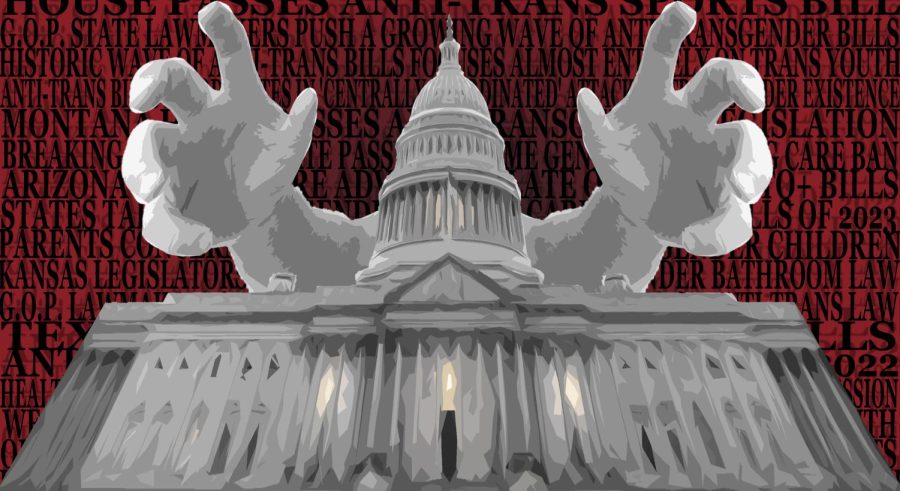Under Attack: The Recent Transphobic Legislation in the U.S.
2023 has been the biggest year for transphobic legislation. Here’s what that means for gender-diverse people in Michigan and the United States as a whole.
Throughout the course of 2023, transphobia within the government has been on the rise. In January, Utah garnered national attention when it introduced five anti-transgender bills, four of which were signed into law. These bills restricted healthcare access for, sports participation of and identification updates concerning transgender people. Other states, including Indiana and Tennessee, also made headlines when they quickly followed suit. Now, over 39 bills have been passed or signed into law in 14 states since January 2023.
This wave of transphobia isn’t new. In fact, 24 bills were signed into law in 2022 across the US. These numbers, though, are much more distinct when time is taken into consideration. Over the entire year of 2022, about two bills were passed per month. In comparison, in the first four and a half months of 2023, over 8.5 bills have been passed per month.
What caused this massive spike in anti-transgender legislation? Eric Stanely, an assistant professor of gender and women’s studies at the University of California Berkeley, attributes a rise in general transphobia to an increase in media coverage of anti-transgender actions. Stanley cites the direct relationship between the reporting on the murder of transgender individuals and the increased murder of transgender individuals as evidence for this claim. “Every year since they started [reporting] murders of trans people, we’ve seen an increase.” They continue, stating, “Paying attention to this violence forces that narrative of progress back.”
Others credit politics itself as the reason for the rise of such legislation. Reporting on the U.S. House of Representatives’ passing of an anti-trans school sports bill, PBS NewsHour claimed, “Opponents criticized the bill as ostracizing an already vulnerable group merely for political gain.”
No matter the cause, the effects are now being felt in over 45 states in the U.S. Only five states have yet to introduce any anti-transgender bills in 2023. The most popular focus is the restriction of transgender people’s access to healthcare with 129 bills having been introduced and 14 passed and signed in this category. The majority of these bills prohibit medical professionals from performing gender-affirming procedures on minors. For example, a bill passed in 2021 titled the “Vulnerable Child Compassion and Protection Act,” sought to ban certain gender-affirming care for minors, among other things. The title alone suggests that this bill seeks to support children, but specifically within context, transgender children. Despite this supposed intention, this directly contradicts countless medical findings. For example, Standford Medicine found that, “transgender people who began hormone treatment in adolescence had fewer thoughts of suicide [and] were less likely to experience major mental health disorders.”
One bill in Indiana plans to remove schools as a safe space for gender-diverse individuals. After a section that attacks the LGBTQ+ community at large, legislators propose that all schools would have to “notify in writing at least one parent of a student of a request made by the student to change the student’s name or pronoun, title, or word to identify the student.” The introduction of this bill means that any student who has come out at school will be outed to their parent or guardian. This could foster an unsafe home life, especially if the student’s parents are transphobic. Students could be abused, neglected or kicked out. In fact, according to the American Academy of Pediatrics, 73% of transgender adolescents reported psychological abuse, 39% reported physical abuse, and 19% reported sexual abuse. Furthermore, approximately 40% of homeless minors in the US are gender-diverse individuals and one in five transgender individuals have experienced homelessness in their lives due to being thrown out by their parents. For many students, school is the only place where they can be open about their identity without fear of the aforementioned abuse occurring at home. This bill, and others like it, remove this safe space for these students.
In addition to these harmful laws, the topic of transgender healthcare isn’t seen as a major issue across the country. In a national poll collected by NPR, PBS NewsHour and Marist in late March 2023, the issue of transgender healthcare and rights was recorded so infrequently when responders were asked what the “Most Important U.S. Issue” was that it wasn’t included in the final set of data. Many feel that legislators, along with “bullying children” according to Deirdre Schifeling, the ACLU’s national political director, are wasting time on bills related to an issue that so few Americans see as pressing in comparison to others.
Michigan is one of the 45 states that has had anti-transgender bills proposed, although none have passed as they have very little support in the state legislature. It is unlikely these bills will become law with such little support. For example, one bill that seeks to restrict student access to bathrooms and changing rooms based on biological sex has received only two sponsors since its introduction on March 7, 2023. Even if this bill, or any similar one, were to gain traction, it is highly unlikely that Michigan Governor Gretchen Whitmer would sign it into law. She has spoken out in support of the LGBTQ+ community before, saying, “From day one, my administration has been on the side of progress – and it will continue to be.”
While gender-diverse individuals in Michigan might not have to worry about state laws being passed to harm them, transphobic individuals in the community are still a major concern. In April 2023, a mural in Lansing, Michigan was painted over with transphobic and homophobic messages. One such message called for the murder of transgender children. This was quickly combated with both city officials speaking out against the transphobic action and citizens painting over the words with trans-positive messages. Despite these responses, the fact is that the occurrence itself indicates the presence of transphobia within Michigan, posing a danger to transgender people within the state.
Transphobia within legislatures, both state and national, is a major concern for the health and safety of transgender individuals. These bills, and others like them, are growing in number and extremity as the year goes on. The Chariot encourages you to speak to your local government officials about ensuring trans rights are secured in your community. To support transgender people, visit https://www.hrc.org/resources/be-an-ally-support-trans-equality, https://transequality.org/issues/resources/supporting-the-transgender-people-in-your-life-a-guide-to-being-a-good-ally and https://www.thetrevorproject.org/resources/guide/a-guide-to-being-an-ally-to-transgender-and-nonbinary-youth/. If you or someone you know is a transgender individual in need of support, visit https://www.thetrevorproject.org/get-help/ or https://www.transcendthebinary.org/remote-health-services/.
Your donation will support the student journalists of Troy High School - MI. Your contribution will allow us to print our work, purchase equipment and cover our annual website hosting costs.


